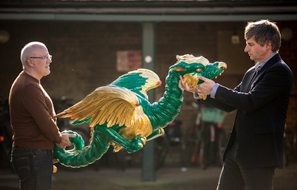Chinese garden set to bloom
A garden is being planned to celebrate Chinese horticulture and enhance the landscape at the soon-to-be-restored Great Pagoda in London's Kew Gardens.
Tony Kirkham, head of the arboretum at Kew, said the project is to build a garden, but not in the context of a formal geometric layout. Instead, the plan is to develop an enhanced landscape of Chinese plants with interesting botanical and medicinal values and histories to harmonize the landscape surrounding the pagoda.
"We have a very good collection of Chinese plants across the gardens in various collections and areas," he said. "This provides an opportunity to strengthen the original cultivations with a more concentrated representation of plants from China and improve our visitors' opportunities to understand Chinese flora."
All the plants that will be sown in the landscape either originated in China or were introduced by well-known botanists and collectors during the late 19th and early 20th centuries. They will be provided by Kew's own nursery and other nurseries in the UK, so there will be no need to import plants from outside Europe, he said.
The Chinese landscape will include Davidia involucrate, also known as the handkerchief tree, a golden larch, regal lilies and other interesting flora from China that grow well in English conditions, including many rarities.
"Many British people have Chinese plants in their gardens, but they are not aware of it, so these plants will highlight the significant impact China has had on our landscape," Kirkham said.
Richard Barley, director of horticulture at Kew, said the idea of the Chinese landscape is a logical and sensible one, because the landscape around the pagoda has received little attention over the years.
"Originally, it was known as a wilderness landscape and William Chambers (the designer of the Great Pagoda) felt it should be a garden with undulating contours and winding parts, so we are going to be respectful of that intent," he added.
As the pagoda will be the dominant structure in the southeast section of the gardens, Barley said the plants around it should be grand and compliment the building.
Although Britain's long-standing gardening tradition is well-known in China, Kirkham said modern British gardeners can gain new inspiration from the country.
"Gardening is good for the soul, and has been a hobby for many people since we began cultivating plants," he said. "There is also the tradition that many homes in the UK have gardens, and in most instances we can learn from the Chinese, especially when it comes to growing vegetables."
Kirkham noted that there is a strong movement in the UK to grow more garden vegetables and become more self-sufficient: "Chinese food is very popular, and there is a push to grow more of the ingredients that feature in these dishes, such as pak choi (Chinese cabbage)."


















